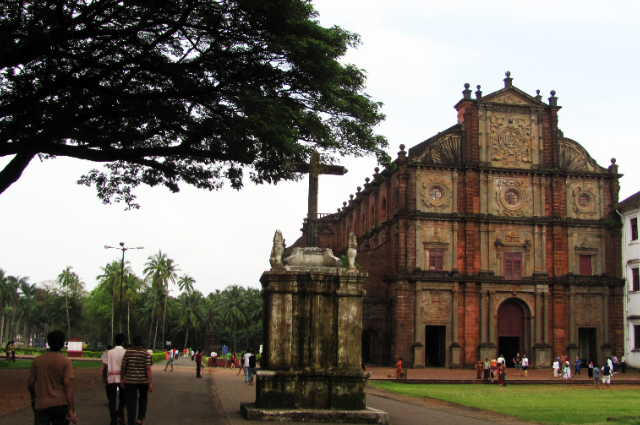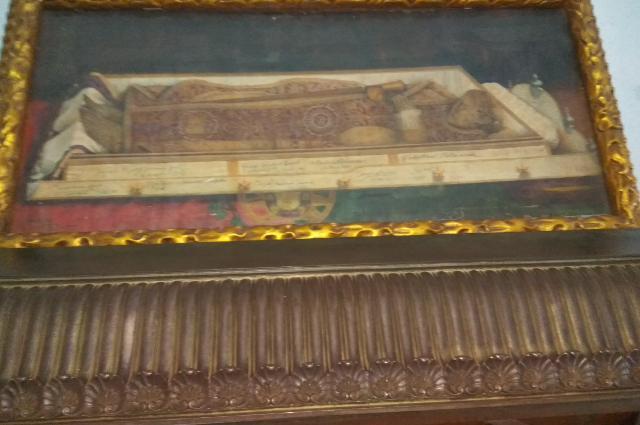In October 2024, Subhash Velingkar, a prominent political figure in Goa, India, ignited a storm of controversy when he suggested that a DNA test be conducted on the relics of St. Francis Xavier, a revered Christian saint whose body is enshrined in the Basilica of Bom Jesus in Old Goa.
Velingkar's proposal met with widespread condemnation and outrage and sparked a debate on religious sentiments and communal harmony in the state.
Who is St. Francis Xavier?
St. Francis Xavier was a Spanish Jesuit missionary. He arrived in Goa in 1542 and established a mission station. His dedication to social welfare earned him immense respect and admiration. He spent years caring for the sick and needy in various regions, including India, Sri Lanka, Malacca, and Japan.
He passed away on December 3, 1552, while on a voyage to China. His body was initially buried on the island of Shangchuan, near the coast of China. However, in accordance with his wishes, his remains were later transported to Goa, India, where he had spent a significant part of his missionary work.
The body was brought to Goa in a lime-slate, a common preservation method at the time.
Historical records and accounts from the time document the transportation and preservation of his body. Upon arrival, his body was found to be miraculously preserved, which was seen as a sign of his sanctity.
His remains were then placed in a reliquary at the Basilica of Bom Jesus in Old Goa, where they have been on display ever since. The Basilica is a popular pilgrimage site, and his body is revered by devotees who believe in his miraculous powers.
The basilica, a UNESCO World Heritage Site, is a major pilgrimage site for Christians worldwide.
The Faith of Goans in St. Francis Xavier
St. Francis Xavier holds a special place in the hearts of Goans, regardless of their religious affiliation. He is venerated by both Catholics and non-Catholics. The saint's feast day celebrated on December 3, is a significant occasion in Goa, marked by religious processions, prayers, and festivities.
Goans believe that St. Francis Xavier has the power to intercede on behalf of the people and grant miracles. Goans lovingly call him ‘Goencho Saib’.
The Controversy Surrounding Velingkar's Proposal
The Church and various political parties have condemned his remarks, viewing them as an insult to their faith and an attempt to disrupt communal harmony.
Critics argued that the suggestion was disrespectful to the saint, to the Christian community, and to the historical significance of the relics. They pointed out that there was no scientific or historical justification for such a test and that it would be a violation of religious sentiments.
A complaint was filed against him on October 6, 2024, and the police had registered a case against him.
After the case was filed, Subhash Velingkar avoided media interactions and was not immediately available to the police. He eventually appeared at the Bicholim police station on October 10 and 11, 2024, to cooperate with the investigation.
The accusation made by Velingkar regarding the DNA test of St. Francis’s relics does not appear to have a base. His claim seems to be rooted in an old assertion by a Sri Lankan journalist that the body of St. Francis Xavier was lost at sea, and the Portuguese might have replaced it with the relics of a 15th-century Buddhist monk, Thhotgamuwe Sri Rahula Thera.
However, this claim lacks credible evidence and has not been substantiated by historical or scientific research.
Subhash Velingkar is a former chief of the Rashtriya Swayam Sevak Sangh (RSS) in Goa. He has been a prominent figure in the state's political landscape and is known for his strong views on cultural and educational issues. Velingkar has a history of controversies, often related to his outspoken nature and firm stance on various matters.
In the past, he has clashed with the BJP government over the medium of instruction in the schools, advocating for the promotion of regional languages over English.
His recent remarks about St. Francis Xavier and the call for a DNA test of the saint’s relics have sparked significant outrage and protests from the Catholic community in Goa.
Current status
The latest update on the controversy involving Subhash Velingkar is that the Bombay High Court’s Goa bench granted him anticipatory bail on October 15, 2024. The case is still ongoing and the investigation is underway.
Impact on Communal Harmony
Velingkar's comments had a significant impact on communal harmony in Goa. Many non-Christian residents of the state expressed their solidarity with the Christian community and condemned Velingkar's proposal. Interfaith dialogues and peace marches were organized to promote unity and understanding.
However, there were also concerns that the controversy could lead to a backlash against the Christian community. Some people feared that Velingkar's comments might embolden extremist elements within certain sections of society.
Miraculous St. Francis
The Goencho Saib performed thousands of miracles during his lifetime and after his death, including raising the dead, healing sickness, multiplying the food to feed the hungry, and calming storms.
In 1554 when the saint’s body was kept for veneration in Goa (two years after his death), a Portuguese woman, in a moment of devotion, bit his toe, and it is said that blood flowed from the wound as if he were still alive.
Thousands of people from all walks of life and various religions visit the Basilica of Bom Jesus in Goa to seek blessings from Goencho Saib. They come with prayers for different favours, be it health, peace, or personal miracles, and many return to offer thanksgiving for the favours received.
My personal experience:
From my childhood, I’ve always been told that Goencho Saib listens to our honest prayers. Whenever a storm arrived in my life, I prayed to him, and he answered. When my mind feels staggered, I kneel at the Basilica, where his relics rest. The peace of mind I receive there is immense and profound.
Exposition of the sacred relics
The decennial exposition of St. Francis Xavier’s sacred relics is a significant spiritual event held every ten years. This year, the exposition will take place from November 21, 2024, to January 5, 2025.
During the exposition, the sacred relics of St. Francis Xavier, including the relics cascade, are brought down for public veneration. Devotees from all over the world come to pay their respects, offer prayers, and seek blessings. It’s a deeply spiritual and emotional experience for many, as they feel a profound connection to the saint.
Navigating Controversies – What we should do
In times of controversy and tension, which can happen in any state, not just Goa, it’s vital that we all remember the values.
Here’s how we should act:
- In times of controversy and tension, it's crucial for all of us to remember the values of empathy and respect that bind us together.
- The government and the police must act swiftly and impartially to address and de-escalate such situations, ensuring the safety and dignity of all citizens.
- Community leaders should promote dialogue and understanding, encouraging people to stand united against divisive rhetoric.
- Citizens, too, play a vital role by remaining calm and respectful, and by rejecting any form of violence or discrimination.
- The media should report responsibly, focusing on facts and avoiding sensationalism.
- Together, through mutual respect and cooperation, we can maintain the harmony and unity that are the bedrock of our society.
Conclusion:
Goa with its stunning natural beauty, is renowned not just for its picturesque landscape, but also for its warm hospitality and deep-rooted sense of communal harmony. It is a place where different communities live together in peace and respect.
However, statements like those made by Velingkar can disrupt this delicate balance, causing hurt and division among people. Such incidents not only create social unrest but also hinder societal progress and the country’s growth. It’s crucial that we strive to maintain and nurture the unity that makes Goa, and indeed India, so vibrant and diverse.
. . .
Reference:


